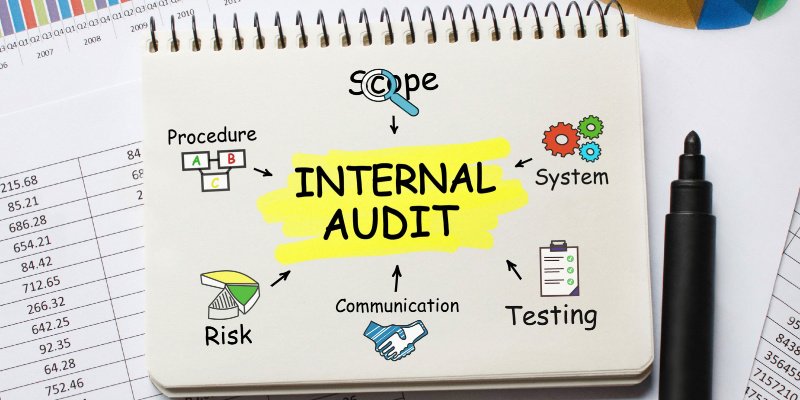In the current business climate, internal audits have become significantly important. Ensuring optimum business processes and compliances is simply impossible without high-quality internal auditing mechanisms in place. Leading business advisory services such as Fortius provide businesses with qualified and experienced auditors for this purpose.
Internal auditors assess risk management practices, governance, and internal control processes. This helps the company anticipate and identify probable issues of all kinds, be it compliance, business processes, or even organisational control.
The Basics of Internal Auditing
Internal auditing, an independent management function, continuously evaluates an organisation's operations. By means of this assessment, it improves a company's processes, ultimately helping businesses reach organisational goals. Businesses in the UAE often employ auditing firms. However, separate internal audit departments within a company or organisation are also quite common.
The Importance of Internal Auditing
The purpose of such audits is, in a nutshell, to ensure that management's internal control mechanisms are functioning as intended. Management's strategy, processes, and tools for achieving the company's stated mission and objectives are all part of the internal control system—also known as administrative controls.
Examples of internal controls are:
- Processes: for setting up and managing daily business activities.
- Systems: Metrics, reports, and constant monitoring are all made possible by systems.
- Actions: Measures taken by management to improve risk management and boost the prospect of reaching predetermined objectives.
Why Do You Need Internal Audits?
Internal auditing is performed for the purpose of assessing the effectiveness of an organisation's internal processes and making appropriate recommendations for enhancement thereof. The following tasks will be carried out by internal audit services as part of an internal audit of your company.
- Check that all the numbers add up and that the accounting and statistics are legitimate.
- Make sure that all purchases and sales of assets are authorised.
- Help in finding and stopping fraud.
- Verify that the obligations have been incurred solely for business purposes.
- Verify that all estimates and accounting policies are reasonable.
- Make sure there are sufficient internal controls.
- Evaluate the effectiveness of the entire system of internal controls.
Types of Internal Audits
The best auditing firms conduct inspections in a number of different internal auditing fields:
- Increasing the effectiveness of the corporation and its operations.
- Maintain accuracy in all forms of reporting- financial, tax, and management.
- Assurance that assets will be safe.
- Adherence and compliance with rules and laws.
Each of the guidelines covers a wide swath of activity and aims to accomplish accurate conclusions about whether or not the data submitted satisfies the needs. It also ensures that the business is complying with all laws and requirements, providing accurate data, and poses no threat to the business.
Internal Audits to Ensure Efficiency of Controls
Internal audits have multiple functions in ensuring efficient internal control. Some of the primary ways in which this is achieved include:
- To help management focus its audit efforts, you must first conduct a risk assessment.
- Evaluation of controls can be useful for pinpointing areas where insufficient safeguards and procedures have been implemented.
- Having a thorough understanding of the insurance industry's methods and procedures, especially those involving the information technology (IT) systems used for processing high volumes of data, like claims and policyholder information, can be attained through thorough process walkthroughs and thorough documentation.
- Prove the controls are performing as expected by testing them.
- Reporting that includes findings and suggestions for bettering processes and controls.
Now, let's take a look at why it's a good idea to conduct internal audits at your company and what benefits you can expect from doing so.
Benefits of Conducting Internal Audits
Internal audits are evaluations performed within a company to prove the efficacy of its processes and underlying operating systems. An organisation's processes and control environment can always be better, and that's why internal auditing is so crucial to any successful business. Let us take a look at the various benefits of internal audits.
Enhanced Internal Controls
Internal controls that effectively supervise, monitor, prevent, detect, and rectify irregular transactions, monitor operational efficiency, and maintain sufficient documentation are essential to the successful execution of business processes and procedures and the achievement of the associated goals.
Reduced Accounting Errors
Decrease the probability of material misstatement in the financial statements of the company. A company cannot produce trustworthy financial statements without some form of internal control or audit.
Decreased Possibility of Fraud
Internal auditing's primary function is to safeguard an organisation by identifying and eliminating instances of fraud and theft. By uncovering fraud, inefficiency, noncompliance with laws, and other unforeseen conditions like theft, an internal audit can protect a company from financial loss.
Maximised Operational Efficiency
To maximise productivity, businesses should perform regular, impartial audits of their policies and procedures to make sure they are being carried out as intended. As a result, the company can rest easy knowing that its guidelines are actually being followed. It gets rid of the potential problems that were anticipated.
Optimised Compliances
The internal audit function is responsible for ensuring that the company complies with all applicable laws, rules, and other legal regulations.
Improved Resource Allocation
Internal Audits ensure that available resources are being put to good use. The Internal Auditor stresses the efficient use of available resources. One way to determine how efficiently a business is using its resources is to monitor its output costs.
Increased Reliability of Operations
Improves dependability and continuity of operations through assistance from an internal audit in locating weaknesses in business plans and providing guidance on improving recovery procedures and contingencies. It's a great tool for fostering reliable relationships with clients, workers, and vendors.
Streamlined Decision Making
Benefits decision-making by providing an outsider's perspective on the company after the managers have been kept out of the audit and all the relevant data has been collected. Ultimately, this aids the company's upper management in making smarter choices for the future.
External Audit Vis-a-vis Internal Audit
The purpose of an external audit is to provide an independent opinion on a company's financial statements. The purpose of an Internal Audit is to evaluate and enhance the Risk Management, Control Process and Effectiveness of Governance.
The role of an external auditor is limited to identifying issues and reporting them. The very essence of internal auditing is to ensure continuous development. As a result of their efforts, both existing systems and proposed new ones are enhanced with the removal of bottlenecks and the reduction of associated risks.
However, as the company expands in size and scope, the management processes become more intricate, and the owners are no longer in complete command. Therefore, conducting an internal audit is useful.
Parting Thoughts
Even if it has no direct bearing on the happiness of the company's clientele, an internal audit is a powerful management tool that can help you stand out from the competition. In order to accomplish its goals and put into place efficient and effective control, risk management and operational processes, internal audits are essential. For this, you can always rely on business advisory services from Fortius. We help you attain these objectives with ease!






